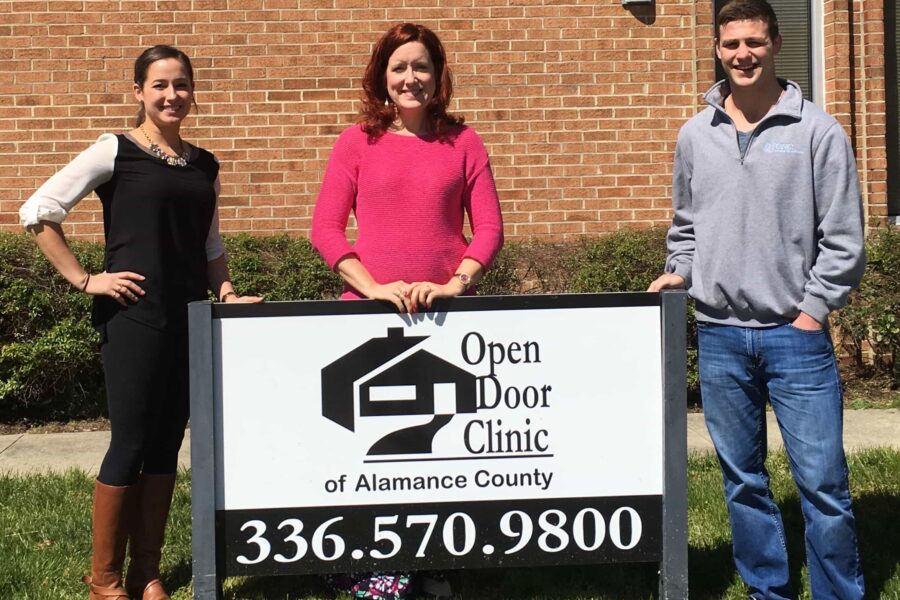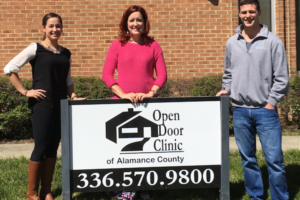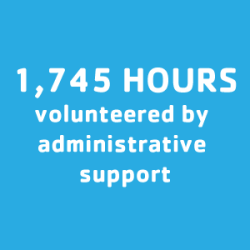When University of North Carolina MD/PhD students Nick Brazeau and Anna Kahkoska volunteered at the Open Door Clinic, which provides free medical care to residents of Alamance County who do not have health insurance, they were surprised to see just how many patients with diabetes were unable to control their blood sugar levels. Brazeau was taken aback by the overwhelming challenges patients faced even though they desired to be healthy.
“Many of them are limited by time, resources, and even access to necessary medications and health care,” said Brazeau, who is a doctoral student in the Department of Epidemiology in the UNC Gillings School of Public Health. “These barriers are immense and often seem insurmountable, which speaks to the tenacity and capacity of patients who strive to overcome them.”
The students wanted to change the entire clinic structure by transitioning from individual appointments to shared medical appointments so they applied to the Schweitzer Fellowship to implement their vision. The process involved collaboration from the clinic directors, the visiting endocrinologists, and all of the students who work at the clinic, including undergraduate students, PA students, and pharmacy residents. After almost a year of running shared medical appointments, they are seeing great signs of improvement among patients in their clinic.
“In aggregate, we’ve seen a reversal in the trend of HbA1c since we started shared medical appointments, where patients who have been seen in this model of care are showing a substantial reduction in HbA1c levels over time. The reduction in HbA1c represents an improvement in glycemic control and a decreased risk for complications down the line,” said Kahkoska, who is a doctoral student in the Department of Nutrition in the UNC Gillings School of Public Health and UNC School of Medicine.
Many underserved patients at the clinic have HbA1c levels (HbA1c measures the average level of glucose in the blood over the previous three months) that initially were high enough to cause serious clinical concern. The shared medical appointments offer time and space for patients to ask questions, share successes, and discuss barriers. However, it also offers patients the opportunity to share their successes and their positive experiences. One participant, for example, was able to bring her HbA1c level down within the target range after several months of shared medical appointments. The patient had focused on taking her medication and begun walking daily, and through the shared medical appointment model, she was able to share her diet and lifestyle change with other patients. “She is a continued inspiration to the other patients in the shared medical appointment setting and to us on the clinic side,” said Brazeau. “Her story illustrates how a caring community and health support network can dramatically change someone’s life as well as set an example for others.”
In fact, the effectiveness of the shared medical appointments has been the most surprising part of Kahkoska’s Schweitzer Fellowship experience. “It has been really incredible to see patients directly influence and support each other in ways that just aren’t possible in the provider-patient relationship,” she said.
To further leverage that peer influence, Brazeau and Kahkoska have emphasized including patients that are having success managing their diabetes with others who are struggling to do the same in the same appointment. Kahkoska is moved by her patients’ generosity in listening to their peers, and sharing their own stories. “In this model, education, support, and inspiration don’t just come from the top down,” she says, “the success of the shared medical appointment directly relies on the interactions between patients.”
One of the things that Brazeau and Kahkoska observed when they were volunteering at the Open Door Clinic is that patients with chronic conditions, such as diabetes, didn’t necessarily see the same provider at their health care visits, and didn’t experience the consequential emotional accountability to those healthcare professionals. “Free care doesn’t necessarily mean improved outcomes if it isn’t accompanied by programming and community support that addresses the complicated and subjective experience of chronic disease management,” said Kahkoska.
With support from their UNC School of Medicine mentors Dr. John Buse and Dr. Laura Young, and Open Door Clinic Director Tracy Salisbury, Brazeau and Kahkoska settled on shared medical appointments as a way of providing continuity of diabetes care for patients, along with education, social support, and a community built on shared experience. In addition, the shared medical appointments provide a valuable education opportunity for all of the different students that staff the clinic. Aside from gaining exposure to novel models of care, students involved in the appointments have a chance to hear more about the patient-perceived experience of diabetes, other aspects of diabetes care, and great complexity involved with fitting the pieces together in a free clinic.
In addition to better glycemic control among their patients and more involvement by students from different programs, Brazeau and Kahkoska have also seen tremendous improvement in patient attendance thanks to the shared medical appointments. Three months into the program, they began to see nearly 100 percent attendance by scheduled patients for the first time. “We thought it was a testament to the fact that patients felt a real value in coming to clinic,” said Kahkoska.
Brazeau and Kahkoska are working to make their program the standard of care for diabetes patients at the Open Door Clinic and sustaining it through the involvement of students from Elon University, the UNC School of Medicine, and UNC endocrinologists. “The shared medical appointments allow substantially more interaction with a physician and permit patients to help, to coach, and to cheer each other on through their battle with diabetes,” said Brazeau. “We hope our legacy will be an improved standard of care and improved health outcomes in patients who previously struggled to control their diabetes.”
Brazeau and Kahkoska also have a broader goal to develop a scalable model for other free clinics and community health centers in North Carolina to address both the management and prevention of type 2 diabetes through shared medical appointments They believe that this model is a great way to integrate students from different health training programs in free clinicsto improve diabetes care for underserved patients.
“Working through a project like this changes the way that I think about health inequity,” says Kahkoska. “It gives me the proof of principle and self-efficacy to continue addressing the problems I see through service.”
Link to original article: http://www.schweitzerfellowship.org/news/peer-support-makes-all-the-difference-for-diabetic-patients/




